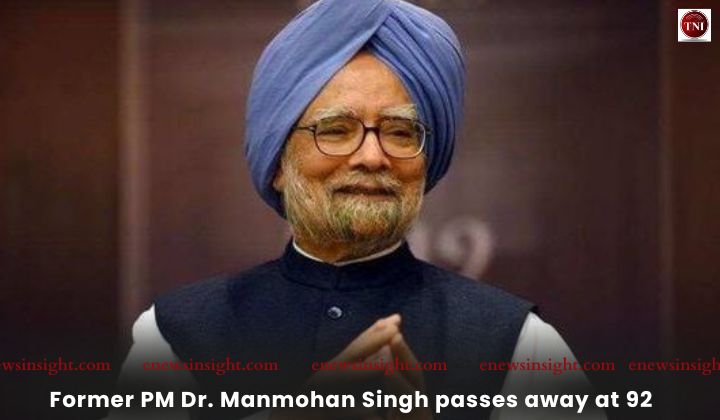Former PM Dr. Manmohan Singh passes away at 92
Nation Mourns the Loss of an Economist, Statesman, and Visionary Leader
New Delhi: Former Prime Minister of India and an architect of the nation’s economic liberalisation, Dr. Manmohan Singh, passed away at the age of 92. The senior Congress leader breathed his last on Thursday evening at the All-India Institute of Medical Sciences (AIIMS) in Delhi, sources confirmed.
Dr. Singh was admitted to the hospital’s emergency department earlier that evening after his health deteriorated. Leaders, including Priyanka Gandhi, rushed to AIIMS to pay their respects to the towering statesman.
The All India Institute of Medical Sciences (AIIMS), New Delhi, issued an official statement confirming his demise and provided details of the circumstances surrounding his passing.
The AIIMS press release stated that Dr. Singh experienced a sudden loss of consciousness at home on the evening of December 26, 2024. Immediate resuscitative efforts were initiated at home, and he was brought to the hospital’s Medical Emergency at 8:06 PM. Despite intensive medical efforts, Dr. Singh could not be revived and was declared dead at 9:51 PM.
Dr. Singh had been undergoing treatment for age-related medical conditions prior to this incident, the bulletin revealed.
Support Independent Journalism? Keep us live.
A distinguished economist and policymaker, Dr. Singh’s career began in academia. After teaching at Panjab University, he pursued his DPhil in economics at the University of Oxford, where he was a member of Nuffield College. His doctoral thesis, “India’s Export Performance, 1951–1960: Export Prospects and Policy Implications,” became the foundation for his seminal book, India’s Export Trends and Prospects for Self-Sustained Growth.
Between 1966 and 1969, Dr. Singh worked for the United Nations, after which he entered India’s bureaucracy when Lalit Narayan Mishra appointed him as an advisor in the Ministry of Commerce and Industry. Over the following decades, he held several key positions in the Government of India, including Chief Economic Advisor (1972–1976), Governor of the Reserve Bank of India (1982–1985), and Chairman of the Planning Commission (1985–1987).
Dr. Singh rose to prominence as Finance Minister during PV Narasimha Rao’s government from 1991 to 1996, leading the economic reforms that liberalised India’s economy and laid the groundwork for its modernisation.
He later served as Prime Minister for two consecutive terms from 2004 to 2014, heading the United Progressive Alliance (UPA) government. Known for his calm demeanour, integrity, and a policy-driven approach, Dr. Singh earned respect as one of India’s most revered leaders.
Earlier this year, Dr. Singh retired from the Rajya Sabha, ending a remarkable 33-year tenure in the Upper House of Parliament. His passing marks the loss of an exceptional statesman whose contributions have profoundly shaped India’s economic and political landscape.
Further details regarding his demise and funeral arrangements are awaited.
Meanwhile, the Congress party has called off Ambedkar rally scheduled to be held in Karnataka’s Belagavi.



Comments are closed.